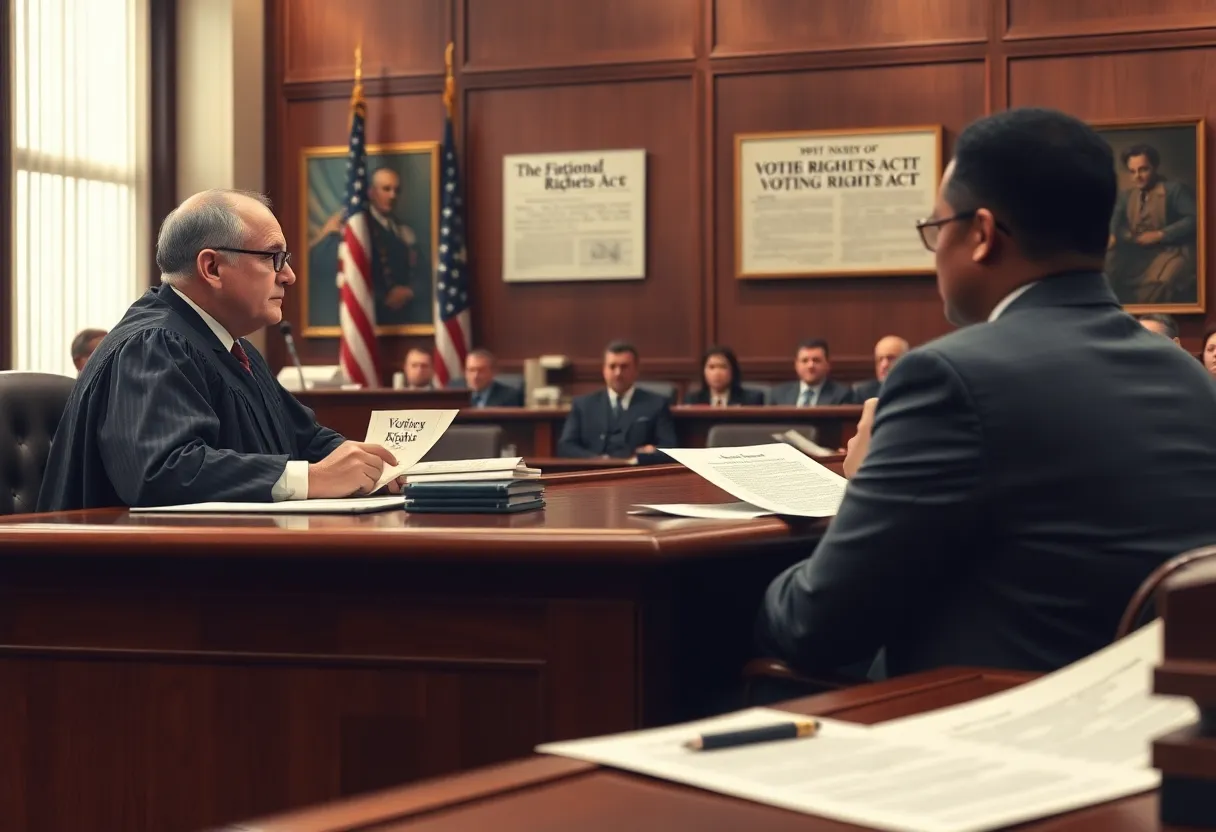News Summary
The Virginia Court of Appeals has allowed the NAACP’s lawsuit against Governor Glenn Youngkin to proceed. The case addresses concerns over the voting rights restoration process, particularly for individuals with felony convictions. The court found that the previous ruling overlooked attorneys’ fees sought by the NAACP, leaving the lawsuit open for further examination. As the voting rights restoration process becomes more opaque under Youngkin’s administration, calls for increased transparency and accountability grow stronger, especially with the upcoming elections and the 60th anniversary of the Voting Rights Act.
Virginia – The Virginia Court of Appeals has ruled that the Virginia NAACP’s lawsuit against Governor Glenn Youngkin regarding the voting rights restoration process can advance. This decision ensures that the challenge to how Youngkin’s administration handles records related to the restoration of voting rights for individuals with felony convictions will be further examined in court.
The appellate court determined that a prior ruling by a Richmond judge failed to address the issue of attorneys’ fees included in the NAACP’s lawsuit, leaving the case open for consideration. As stated by the court, the previous appeal was dismissed without prejudice, allowing the matter to be sent back to the trial court to examine the attorney fee issue.
The legal action initiated by the Virginia Conference of the NAACP stems from a Freedom of Information Act (FOIA) request. The organization sought records detailing the administration’s handling of voter rights restoration for felons, a significant matter in Virginia, where individuals with felony convictions lose their right to vote unless they either receive a pardon or petition the governor for restoration.
Under previous governors, the process for restoring voting rights tended to be streamlined and automatic after individuals completed their prison sentences. However, the Youngkin administration changed this process to a petition-based system, resulting in fewer applications being granted and a lack of clarity regarding the criteria for approval.
To promote transparency in the restoration process, the NAACP filed their records request. While Youngkin’s administration provided some information, they withheld crucial documents, arguing that these were classified as “working papers,” which are exempt from FOIA requirements. This withholding has raised concerns about transparency and accountability in the decision-making related to voting rights.
Many individuals whose applications for voting rights restoration have been denied expressed frustration over the lack of information regarding the reasons for their rejections. This has contributed to a sense of disenfranchisement among ex-felons who feel that they are being excluded from an essential civic duty.
An incident involving a mass email sent to individuals whose applications were denied led to a surge of awareness among ex-felons regarding the obscure process for restoring their voting rights. This revelation has prompted calls for clearer guidelines and more access to information about restoration decisions.
This year, a constitutional amendment was passed to facilitate the automatic restoration of voting rights for individuals who have completed their sentences. However, this measure requires a second passage in the next legislative session and subsequent approval from voters for it to take effect.
Despite some reservations expressed by GOP lawmakers, Youngkin’s administration is moving forward with the proposed constitutional amendment. If the amendment ultimately fails to secure statewide support, future governors may retain the current petition-based restoration approach or choose to implement changes to the process.
As Youngkin nears the end of his term as governor, the debate surrounding the voting rights restoration process is set to continue, particularly in light of the approaching election cycle. The Virginia NAACP has reiterated the importance of transparency in such processes, especially as the nation observes the 60th anniversary of the Voting Rights Act of 1965. They have called for an end to ambiguous policies that serve to disenfranchise citizens and obstruct civil rights.
Deeper Dive: News & Info About This Topic
- Virginia Mercury
- Jay Jones Statement
- Rappahannock News
- Wikipedia: Voting rights in the United States
- Encyclopedia Britannica: Voting Rights

Author: STAFF HERE WILLIAMSBURG WRITER
The WILLIAMSBURG STAFF WRITER represents the experienced team at HEREWilliamsburg.com, your go-to source for actionable local news and information in Williamsburg, James City County, and beyond. Specializing in "news you can use," we cover essential topics like product reviews for personal and business needs, local business directories, politics, real estate trends, neighborhood insights, and state news affecting the area—with deep expertise drawn from years of dedicated reporting and strong community input, including local press releases and business updates. We deliver top reporting on high-value events such as Williamsburg Farmers Market, Yorktown Market Days, and Busch Gardens Food & Wine Festival. Our coverage extends to key organizations like the Greater Williamsburg Chamber of Commerce and Colonial Williamsburg Foundation, plus leading businesses in education and hospitality that power the local economy such as College of William & Mary, The Williamsburg Winery, and Sodexo. As part of the broader HERE network, including HEREVirginiaBeach.com, we provide comprehensive, credible insights into Virginia's dynamic landscape.


